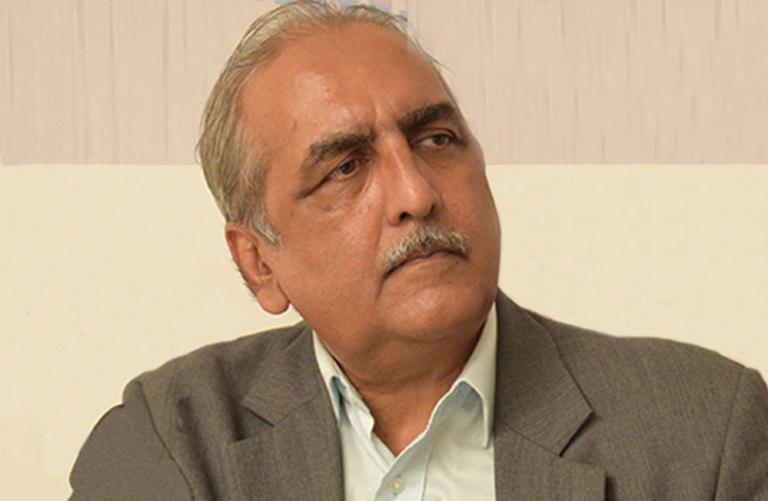Africa-Press – Mauritius. The contestation of the last elections is still not seen to subside even after three weeks since taking office, and things will get complicated with the election petitions that will follow in the days to come.
A second term that does not start in serenity with the allegations of irregularities . . . How do you react to that? Rajiv Servansingh: I’m sorry I don’t share your point of view on this. What I see is a small minority group that refuses to accept the election results.
Perhaps this is because they had come to believe in their own “Fake News” such as the so-called MI5 report which appeared on the net a few days before the elections and which predicted a clear victory for the National Alliance.
and only 4 elected for the Morisian Alliance. As for election petitions, it is of course permissible for any Mauritian to have recourse to them following an election and it will be up to the judges to decide on the validity of the arguments.
So I repeat: in terms of serenity, I see a large majority of Mauritians who have resumed their normal course of life after a particularly hectic month of campaigning.
* But must we still recognize that this is the first time that we find ourselves with ballots lost in nature, approximate explanations – even burlesque, according to Internet users -, officials responsible for the exercise of counting of votes.
A third ballot paper found in the wild at the start of the week was handed over to the police by the care of the parish priest of Saint Patrick’s Church .
. All of this is not normal, is it?
Is this really the first time? Weren’t there any reports of ballot boxes found in a river after the 1991 election? The police are currently investigating and we hope they can clarify this matter.
I have been a candidate in a general election before and have complete confidence in the monitoring system put in place not only by the Election Commission but also by all the political parties involved in these elections.
I would like to be told how we can “distort” an election in our system. More precisely that someone come and explain to me when this takes place: between the opening of the polling stations, the voting process, the sealing of the boxes and the opening of them for the counting the next day.
under the surveillance of agents of all parties. * 2019 has amply demonstrated this to us with the very thin gap between L’Alliance Morisien and L’Alliance Nationale that a three-way fight further complicates matters in an electoral battle.
Do not close struggles actually represent a danger to our democracy because of the temptation of trafficking on both sides? In a two-man fight in 2010, the MMM won 42% of the votes cast to end up with a very limited number elected to parliament.
By 1983, after the demise of the MMM, the stakes in the elections had grown to such proportions that the election campaign had been marked with anger and aggressiveness that had probably never been seen before except for the 1967 elections.
And yet, in both cases, the losers had accepted the outcome of the ballot box in a democratic spirit. I remember that Paul Bérenger was the first to call for “reconciliation” after the country was divided into two during the 1983 campaign.
In any three-way fight, it is more than likely that the party that wins the election will get no more than 51% of the votes cast unless there is a hegemonic party. However, all the parties that took part in the 2019 elections knew the rules of the game.
In truth, the MMM and the Labor Party seemed to be calling for this three-way fight, hoping that it would allow them to beat the pawn in the MSM especially in the event that there is a need to have a post-electoral alliance to govern.
As for the question of the temptation of “trafficking”, I still believe that political parties know full well that it is not possible to “distort” the results of the ballot box in practice.
The alternation of parties in power since elections have been held regularly in the country shows that this kind of practice only exists in the minds of sore losers. Until proven otherwise, there is therefore no danger to our democracy, of which every Mauritian should be very proud.
In these circumstances, a commission of inquiry, as requested by Lindsay Rivière, to shed light on, among others, the case of these 6,813 voters who could not vote, would therefore not be necessary, in your opinion, both for the reputation of the Electoral Commission and that of the country?
It is obvious that the fact that almost 7,000 voters could not express their choice in these elections is a serious matter. That there are flaws in the voter registration system that definitely needs to be addressed. However, from there to making it a case of fraud, there is a step that I will not take.
Such an assertion would imply that the officers of the Electoral Supervisory Commission and the officers of the Civil Service who worked on the registration exercise hatched a vast plot to favor a particular political party – I leave it to those who want to propagate this theory take responsibility.
So I do not see the need for a commission of inquiry which would imply that there was any wrongdoing. But the Electoral Commission, which enjoys the confidence of the population, must certainly work to improve the system which was put in place a very long time ago and which deserves to be reviewed in the light of new realities such as mobility.
increased population. * Beyond the ‘freebies’, the various promises made concerning the increase of the old age pension, the denigration of the opponent or even the attacks under the belt made on both sides, what is it? distinguish L’Alliance Morisien, according to you, from its adversaries and who made the difference?
I had in an email sent to a friend on November 2 last described in an attachment the reasons why the National Alliance would lose the elections and predicted that the Morisian Alliance would win between 34 and 38 seats and the MMM between 8 and 12.
During this last electoral campaign, one can hardly speak of “strategy” on the part of the National Alliance so much the messages were scrambled and the actions and decisions completely incoherent. Take, for example, the notion of “BREAKING” which was to be the basis of the National Alliance’s proposals and the common thread of their campaign.
With the announcement of the candidates, the notion of breaking with the past had already taken a heavy blow, as voters, including those of the National Alliance, were shocked by this return of “political dinosaurs” to the fore.
Over the course of the campaign, the very notion of rupture was to gradually disappear from speeches and instead it was quite the opposite – the National Alliance adopted what advertisers call a “Me Too Campaign” – the National Alliance contenting itself with repeat the same promises as the Morisian Alliance but promising to do even better.
The voters were not fooled and preferred to trust the outgoing government, which had implemented a series of measures benefiting the most disadvantaged classes. In short, the National Alliance was never able to convince voters that it was proposing a real policy of “rupture”.
Faced with a choice between the outgoing government which promised to continue the work already started – whether in terms of public infrastructure achievements or social measures favorable to the most disadvantaged – and the ‘challengers’ who had found nothing better than proposing the same thing, the decision was predictable.
Opposite the Morisian Alliance had a very clear message and a campaign focused on two themes. First, to promote the achievements of the government of Pravind Jugnauth in terms of social measures as well as in the visible field of public infrastructure (metro, bridges, roads, hospitals, etc.
The second axis was to attack the challenger Navin Ramgoolam by exploiting the weak points of the latter and the scandals associated with his last term.
The Morisian Alliance deserved credit for not deviating from this “strategy” and was thus able to send a coherent message as to why the government should be renewed.
* Do you think that the opponents of the MSM were wrong to underestimate this party and especially the management team?
I’m not sure if the opponents of the Morisian Alliance underestimated their opponent’s strengths, but it is clear that they overestimated their chance to bring about a change, hence, I think their difficulties in internalizing the defeat.
Winning an election is one thing; running the country for the next five years with electoral promises to keep and major infrastructure projects to finance – which will weigh heavily on the national budget – promises to be complicated.
Do you see the Government taking up this challenge without too much damage and without making itself unpopular very quickly? It is obvious that the country will have to face major economic challenges in the coming years. A new economic team is being set up with a new Minister of Finance, Planning and Economic Development at its head.
In macroeconomic terms, we can argue that the priority of priorities remains a revival of growth beyond the psychological bar of 4% – we could argue that to meet the government’s commitments a growth of 5% would be the target to be achieved within two years.
To do this, we need to attract more investment in productive, innovative, job-creating and – as far as possible – high-value-added sectors. This is essentially what we are talking about when discussing the structural changes that are necessary to realize our ambition to become a high income country while supporting strong and sustainable growth.
Such a reform would take into account a decisive factor which will strongly mark the new model of economic development – we have an aging population and the number of people who will enter the labor market in the coming years will decrease.
It is therefore imperative to define a national training policy while further facilitating the opening of the country to foreign skills to complement and increase the knowledge capital which in its wake brings innovation and high value-added production.
Sectors with high potential in this context remain the service industries (tourism, financial services, port facilities, etc. ) as well as textiles and pharmaceutical products, not to mention the ocean economy.
A modern agro-industry based on advanced technologies and an organization in line with the aspirations of young Mauritian entrepreneurs who want to get into this sector, this also remains a priority and offers real opportunities if only in terms of import substitution possibilities to ensure greater food security.
The cane industry retains strategic importance in the future development of the country and it is imperative to reinvent it with the participation of all stakeholders in a process of reflection on the future of this sector.
* You are thinking of what in terms of measures that can finance the next budgets: a heavier and more progressive taxation or will we have to look at the side of friendly countries, such as Saudi Arabia, India and China, etc.
, with a view to increasing their support for the national budget?
The issue of taxation is at the heart of economic debates today at a time when institutions like the IMF and the World Bank recognize that income and wealth inequality around the world has become a highly dysfunctional factor in the economy.
development of effective economic policies. In Mauritius, the redistribution policy undertaken by the Government over the past few years has helped to initiate a reversal of the trend, as reported by the Bank of Mauritius, citing the Gini coefficient.
I believe that the finance minister’s dedication to such a philosophy will continue to determine his economic policy in the future. My very personal opinion and this obviously only commits me, is that an increase in taxes on companies that make profits beyond a certain threshold, from 15% to 25% should be possible without any effect.
on the productivity and the commitment of our large companies to continue to “maximize value for their shareholders”. The famous “Flat Tax” was introduced in Mauritius by the duo Rama Sithanen-Ali Mansoor under the influence of the prevailing neoliberal ideology at that time.
Following this ideology, the promise sold to the nation was that such a measure would trigger an explosion of private sector investment and result in economic growth of 8-10% annually and thus bring unprecedented prosperity.
“The rest is history” as the Englishman would say. It did not happen.
Under this same chapter and precisely under the influence of this same neoliberal ideology that has prevailed for many years in Mauritius, the wage gap between the highest executives in the most profitable sectors of our economy and those at the lowest the scale in the same company has made an unimaginable leap for the majority of Mauritians, as the salaries of senior executives, and even for those of public companies, remain a taboo subject.
It is therefore possible to tax these high salaries gradually for those at the top of the hierarchy. This being the case, it must be recognized that it would also be irresponsible and inappropriate for any government that would take such a measure not to combine them with strong measures in order to minimize the waste of public funds, to ensure more transparency in the use.
of these funds and to make those who authorize these expenditures “accountable” to justice. * To come back to this question of rupture as advocated by Labor, if we do need a rupture, what do you think the country deserves in terms of a real rupture?
I didn’t have the opportunity to see a real disruptive program either in form or content during the election campaign. To hear from Labor Party supporters themselves, it is continuity that has instead prevailed and has done immense damage to the party’s chances of forming a government.
The most important break that is needed at this stage is the rejection of the dogmatic neoliberal model which stipulates that the impersonal laws of the market are supposed to promote the best use of available resources and to distribute products and services in the most efficient way. correct. The whole world is witnessing the nefarious result of this ideology which has lasted too long.
A fortiori one can argue that in Mauritius this ideology is totally incompatible with our historical experience based essentially on a private sector-public sector collaboration in the determination of proactive economic policies which have so far favored our economic success and the creation of new pillars.
However, we cannot ignore the fact that the global economic environment has changed drastically in recent decades and that our analytical tools and practices must necessarily take this into account.
The inclusion of the terms “Economic Planning” in the mission of the new Ministry of Finance and Economic Development gives hope that the Government intends to deploy a development model that is more “policy driven” and proactive and not left to the forces alone. of the market.
* To come back to the 2019 elections, the performance of the Labor Party in these elections with 33.50% of votes collected shows that a good part of its electorate is still there to support the party, while as regards the MMM it’s the 10th defeat, as Steven Obeegadoo likes to remind us.
How does the future look for these two parties and their leaders, in your opinion? The MSM-ML won 37% of the vote against 33.5% for the Labor Party and PMSD while the MMM had an honorable score of 22%.
The party that forms the government is the one that wins the most seats in the election, and everyone who took part in those elections knew the rules of the game.
To brandish these numbers as if to “illegitimize” the MSM victory is a matter of demagoguery unless one of the other participating parties declares that, in similar circumstances, it would have given up taking power.
In Mauritius, we have been so accustomed to a struggle between two major alliances for each election that it would seem that the Mauritians have difficulty assimilating the result that came out of the polls on November 8th.
The probability that one of the political parties involved would obtain more than 50% of the votes cast in a three-party election was remote under these circumstances.
In all major multiparty democracies, the likelihood that the party that elects the most representatives to parliament will not necessarily win more than 50% of the vote is an accepted idea – for example, it is good to to know that in Denmark Mrs Frederiks of the Social Democratic Party formed a government after her party was elected with 25.9% of the vote; in Great Britain, the government of Theresa May elected Prime Minister in June 2017 won 42.4% of the vote; in Australia Scott Morrison is the Prime Minister following elections in May 2019 where his National Party / Liberal coalition won 41.44% of the vote and, believe me, I could add a long list of similar cases as in Spain or in Austria…
* The idea of an alliance between the PTr and the MMM is already gaining ground, it seems. What would be the desired objectives, according to you? Counter the power in place? What else ? It would be very naive to start speculating about alliances for the next election to be held in 2024.
Remember the 2000 election when an MMM-MSM alliance was struck just weeks before the “Nomination” Day ”or, even closer to us, how after having“ frequented ”the MSM for many months, the MMM ended up concluding an alliance with the Labor Party, concocted with great noise with the harmful consequences that we know .
For More News And Analysis About Mauritius Follow Africa-Press







